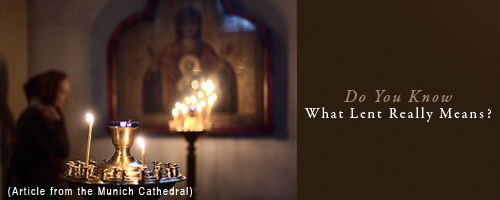
�Better to Die in Our Struggle Than to Live in Our Fall��
St Isaac the Syrian
It is more important to have the correct understanding of fasting than it might seem. Generally, there are over 200 lenten days, which is over a half of the year, which means more than half of our lives from the moment of baptism. If lent becomes an inseparable part of life, as should everything be that the Orthodox Church carefully preserved and passed down through the centuries, then with time, one�s life seems to change almost by itself, and a person begins to live in a perpetual miracle, but also in perpetual podvig [spiritual effort].
To force yourself to live in truth is a podvig, while �to close one�s eyes,� that is, to neglect the truth and behave in a way that is obviously against His Holy Divine Will, is to fall. Only then will virtue be genuine before God, when it is brought as a pure sacrifice of love with self-subjugation and the denial of one�s own will for the sake of life with God in eternity, which already begins here in this life.
The Lord said: �Enter ye in at the strait gate: for wide�is�the gate, and broad�is�the way, that leadeth to destruction, and many there be which go in thereat: because strait�is�the gate, and narrow�is�the way, which leadeth unto life, and few there be that find it� (Matthew 7:13-14).
(The Fast of SS Peter and Paul in 2011 begins on June 20 until July 12, the feast day of the Holy Apostles, lasting a total of 22 days.)
Fasting is a spiritual effort. Reading the Holy Fathers becomes easier during a period of fasting, not so much for the mind, but for the soul. The works of the Holy Fathers about fasting only confirm that in the Church, at all times and to this very day, everything happens by the Holy Spirit. At all times there have been people who have heeded the Word of God, who have followed Him and have became saints. At all times, the path to freedom from sin and towards holiness was closely bound to fasting and prayer. In our times, the very same Spirit calls upon us to take upon ourselves the podvig of fasting and wishes to sanctify those who seek Him and the faithful.
�True fasting consists not only of the exhaustion of the flesh, but in that the very piece of bread we had wished to eat we instead give to the hungry,� St Seraphim of Sarov.
The collected works of the Holy Fathers, such as St Ignaty (Brianchaninov), St Basil the Great, St Abba Dorotheus, St John Chrysostom, Holy Abba Isaiah, St Gregory Palamas, Abba Evagrius, St Theophan the Recluse, St Seraphim of Sarov, St Macarius of Egypt, St John Cassian the Roman, St Ephraim of Syria, St Pimen the Great, St Diadochos, St Gregory of Nyssa, St Mark of the Ancient Paterik, the Otechnik and Lavsaik, and the works of other spiritual writers, our contemporaries, are offered as reading matter.
It is impossible to grasp all the virtues at once, and to immediately fulfill them in perfection, as it is impossible to instantly free yourself from predilections and sinful habits. The time of fasting helps us upon this path. That is why every fasting day is new and interesting and joyous and emancipating, though it is accompanied by hardships, which we are called upon to overcome and thereby mature. Whoever properly understands and accepts fasting in time will see its great benefit, making it the norm in one�s life. Those �pleasures� which it would seem unthinkable to deny oneself will either cease to have their allure or will assume their proper place in our lives.
Gradualness, prudence, persistence�these are all qualities known to everyone who wishes to achieve a goal, and these qualities are necessary in spiritual life as well. But this applies to the primary goal and also to the lesser goals which lead up to it. They once said about a certain elder: every year he set as a goal for himself some virtue with the words: �this year I will eat nothing boiled,� or �I won�t do this�� �I won�t do that�� And so he took up each new effort: completing one, he would take up another, and he did this every year. Settling on a goal and measure of fasting in light of one�s circumstances is helped by one�s spiritual father.
The main act of fasting is repentance. Repentance is the foundation of the transformation of thought and life. With a sense of repentance we approach the Church and the Mystery of Confession. Freeing ourselves from the burden of sin, in hopes of a renewed life, we receive the Body and Blood of Christ in Communion, we receive guidance from the priest and return then to daily life. The world around us does not know that we have now become different, we have become of Christ, of God.�
|